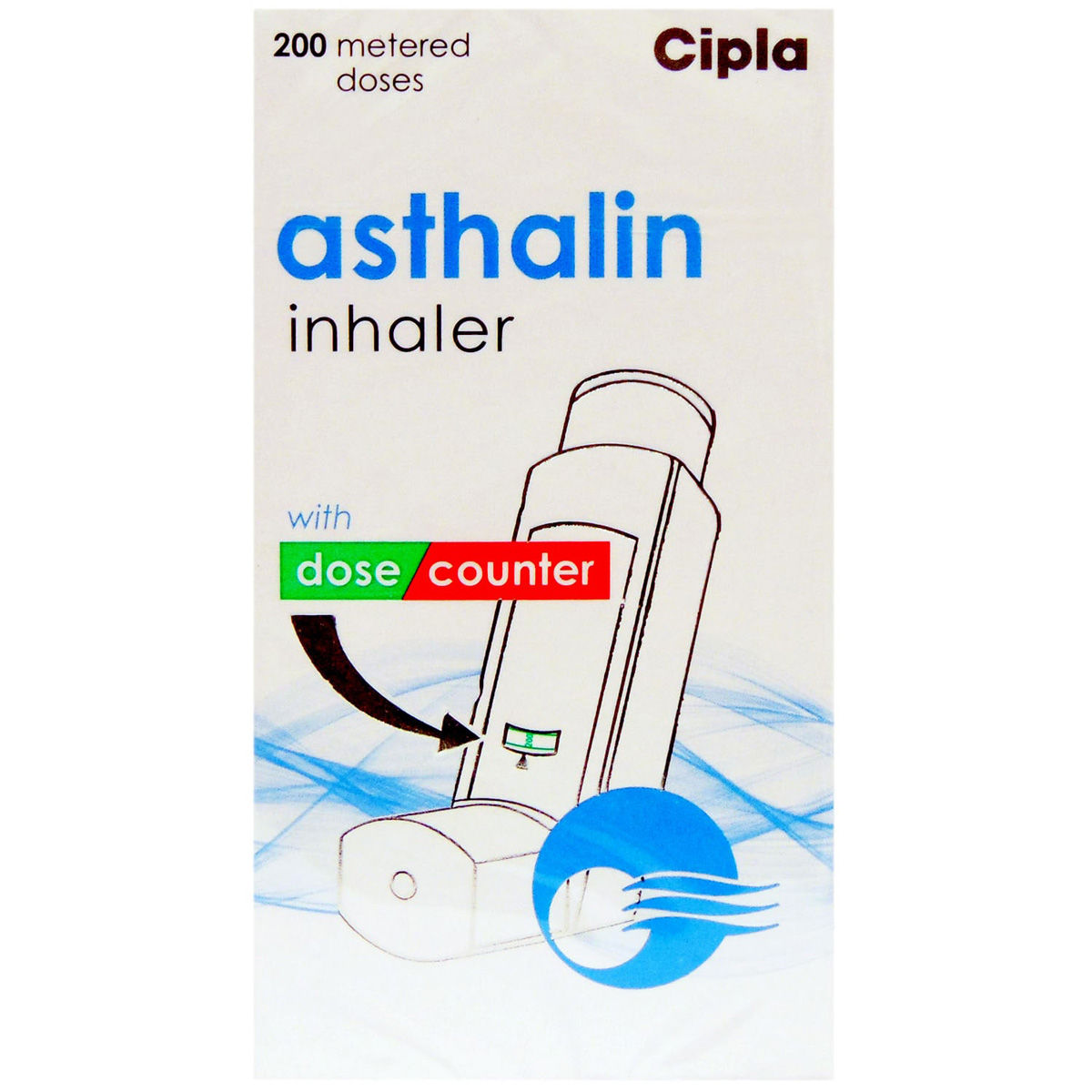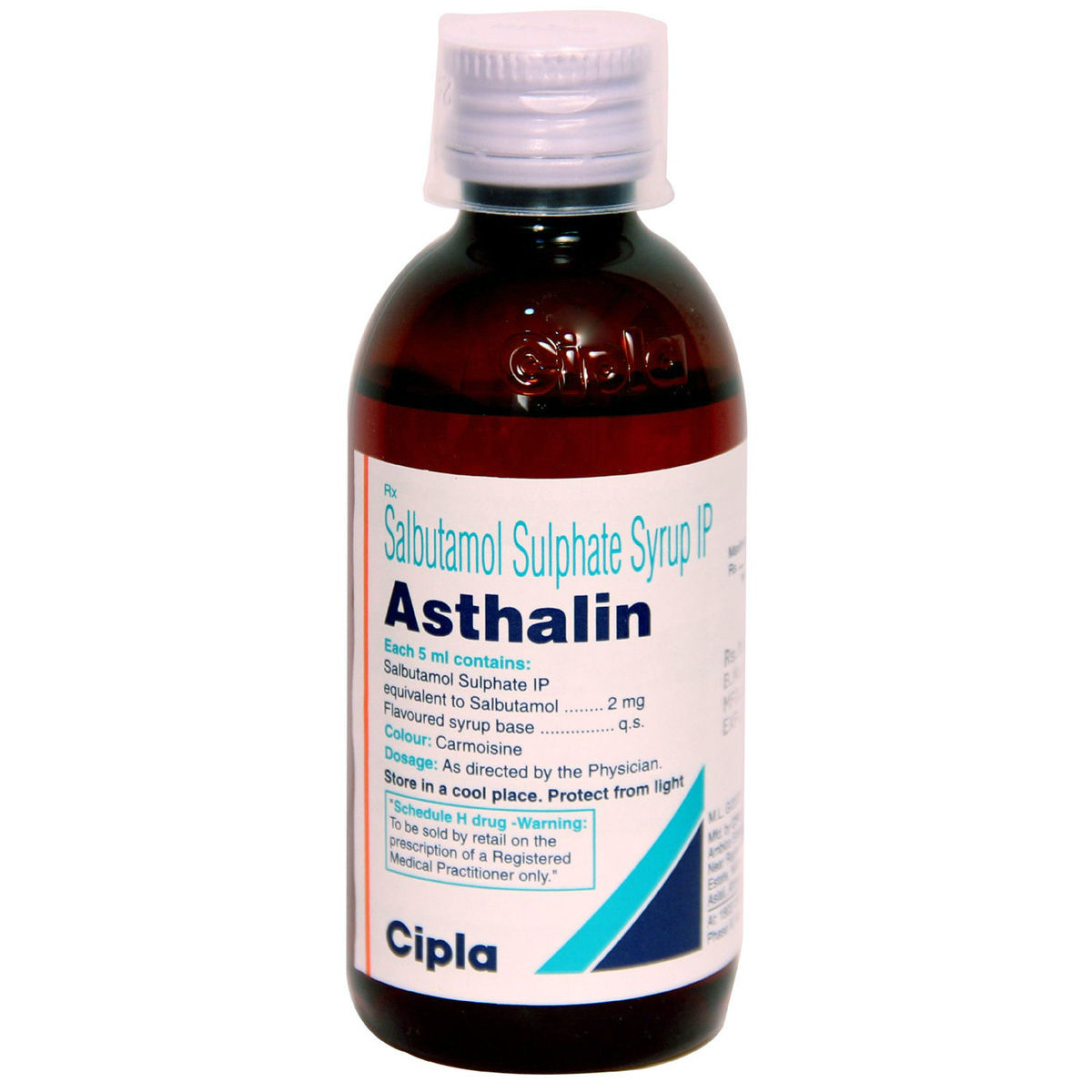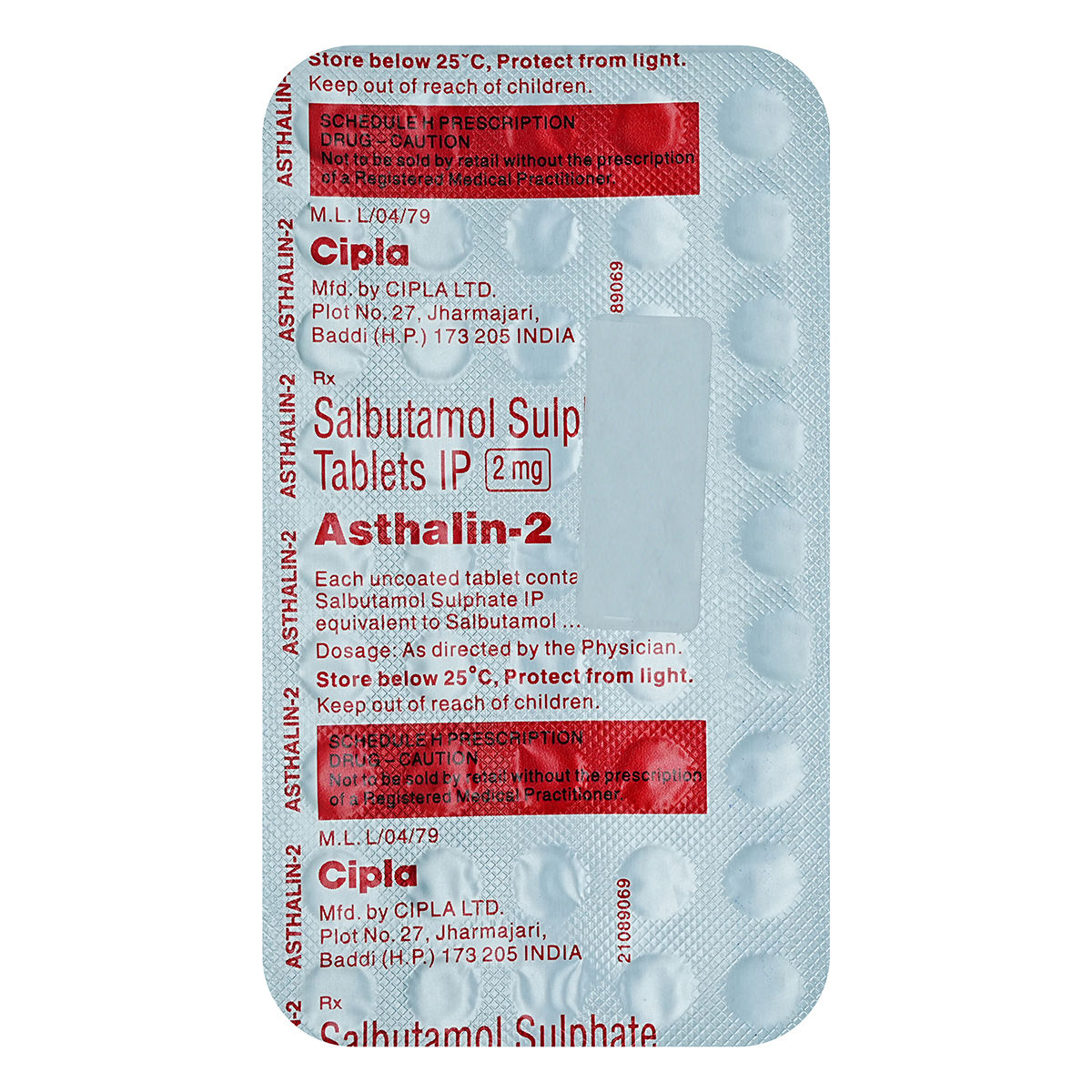Salbutamol
About Salbutamol
Salbutamol is used to treat asthma and chronic obstructive pulmonary disease (COPD). Salbutamol helps to relieve symptoms like coughing, wheezing and shortness of breath. Asthma is a breathing problem in which airways narrow, swell and produce extra mucus, leading to difficulty breathing. COPD is a group of lung diseases with emphysema (shortness of breath) and chronic bronchitis (inflammation of the lining of your bronchial tubes).
Salbutamol contains 'Salbutamol,' which is a β₂ adrenergic receptor agonist. It relaxes the muscles in the airways and increases airflow to the lungs. Salbutamol makes breathing easier by widening the airways.
Your doctor will advise on how often you take Salbutamol based on your medical condition. The common side effects of Salbutamol include nausea, vomiting, restlessness, tremor (shakiness), headache, muscle tightness, dryness or soreness of the throat, dizziness, sleepiness, palpitations (irregular heartbeat), nasal congestion (stuffy nose), cough, and increased heart rate. Most of these side effects of Salbutamol do not require medical attention and gradually resolve over time. However, if the side effects are persistent, please seek medical help.
Brief your medical history if you have any heart, liver or kidney diseases, hyperthyroidism (overactive thyroid), stomach ulcer, seizure (fits), high blood pressure and diabetes before taking Salbutamol. Bronchodilators like Salbutamol can cause a rise in blood sugar levels. Hence, diabetic patients should monitor their blood glucose levels and use this medicine only with a doctor's advice. Bronchodilators also cause hypokalaemia (low potassium levels in the blood) in some patients, leading to severe heart diseases, so Salbutamol should be cautiously administered. Please check with your doctor if you are pregnant, currently breastfeeding, or taking any other prescribed or non-prescribed medicines. Avoid drinking alcohol while taking Salbutamol as it can worsen your sleepiness. Try not to stop taking this medicine of your own.
Uses of Salbutamol
Medicinal Benefits
Salbutamol is a bronchodilator which contains Salbutamol. It helps treat respiratory problems like asthma, chronic obstructive pulmonary disease (COPD) and chronic bronchitis. It works by relaxing and widening the lungs' airways, making it easier to breathe, especially in asthma and COPD patients. It is generally a long-term treatment.
Directions for Use
Swallow the tablet as a whole with a glass of water. Do not chew, crush or break it.
Storage
Side Effects of Salbutamol
Nausea
Vomiting
Restlessness
Tremor (shakiness)
Headache
Muscle tightness
Dryness or soreness of the throat
Dizziness
Sleepiness
Palpitations (irregular heartbeat)
Nasal congestion (stuffy nose)
Cough
Increased heart rate
Drug Warnings
Inform your doctor beforehand if you have any heart, liver, kidney diseases, hyperthyroidism (overactive thyroid), stomach ulcer, seizure (fits), high blood pressure and diabetes before taking Salbutamol. Bronchodilators also cause hypokalaemia (low potassium levels in the blood) in some patients leading to severe heart diseases, so Salbutamol should be cautiously administered. Also, let your doctor know if you plan to become pregnant or already pregnant and a lactating mother since Salbutamol may cause cleft palate and limb defects in new-borns when used by pregnant women. Drinking alcohol can worsen your sleepiness and affect your mental ability when you are being treated with Salbutamol.
Drug Interactions
Drug-Drug Interaction: Salbutamol may interact with non-selective beta-blocking drugs (propranolol), antidepressants (clomipramine), anti-hypertensive drugs (guanethidine and methyldopa), anti-anxiety drugs (diazepam, lorazepam), blood clot drugs (ticlopidine), gout drugs (allopurinol), heart rhythm drugs (verapamil), hormone problems/birth control drugs (oestrogen, progesterone), immune disorder drugs, anti-seizure drugs (phenobarbital, phenytoin), and stomach acid-reducing drugs (cimetidine).
Drug-Food Interaction: Limit alcohol intake since it may worsen the side effects like sleepiness and shakiness.
Drug-Disease Interaction: Caution and doctor's advice is recommended in conditions like gastric or peptic ulcer, sepsis, hypokalaemia (low potassium in the blood), lactic acidosis (excess acid in the bloodstream), liver/kidney diseases (especially cirrhosis or hepatitis), fluid in the lungs, heart problems, overactive thyroid, and seizures (fits).
Drug-Drug Interactions Checker List:
Safety Advice

Alcohol
unsafeYou are recommended not to consume alcohol along with Salbutamol to avoid unpleasant side-effects like drowsiness, dizziness, or sleepiness. It may also lead to a life-threatening condition like coma if taken with excessive alcohol.

Pregnancy
cautionPlease consult your doctor if you are planning to become pregnant or already pregnant before starting Salbutamol.

Breast Feeding
cautionThere is limited data on how Salbutamol affects breastfeeding. Please consult your doctor before starting Salbutamol.

Driving
unsafeSalbutamol usually causes dizziness, drowsiness, muscle cramps and visual disturbances which may affect their ability to drive or operate machinery. So, do not drive or operate heavy machinery if you feel sleepy or dizzy after taking Salbutamol. Tell your doctor if you get these types of side effects.

Liver
cautionSalbutamol should be used with caution in patients with liver diseases. Let your doctor know if you have any history of liver diseases or hepatic impairment. Your doctor will weigh the benefits and potential risks before prescribing Salbutamol.

Kidney
cautionSalbutamol should be used with caution in patients with kidney diseases. Let your doctor know if you have any history of kidney diseases. Your doctor will weigh the benefits and potential risks before prescribing Salbutamol.

Children
cautionSalbutamol is not recommended for children under 2 years of age. However, it can be given to children 2-12 years of age only if the doctor has prescribed it.
Habit Forming
Diet & Lifestyle Advise
Take the medication as directed by the doctor and at regular intervals. Do not use other over the counter medications, herbal or vitamin supplements without informing your pharmacist or doctor when you take Salbutamol.
Know your triggers like allergens, such as pollen, dust and food items that make your asthma severe.
Quit smoking and avoid passive smoking. Smoking also reduces the effectiveness of the medicine.
Eat a healthy diet and exercise regularly to strengthen your breathing muscles and boost your immune system.
Learning breathing exercises will help you move more air in and out of your lungs.
Special Advise
Monitor your blood glucose levels regularly since bronchodilators can raise blood sugar levels.
Keep a check on your heart condition (if you are heart disease patient) with an ECG if you notice any rapid heartbeat and blood pressure changes.
Undergoing a blood examination for your potassium levels in the blood will help rule out the possibility of hypokalaemia.
Patients Concern
Disease/Condition Glossary
Asthma: A breathing problem in which airways narrow and swell and may produce extra mucus, which may lead to breathing difficulty and trigger cough, a whistling sound (wheezing) when you breathe out and shortness of breath.
Chronic obstructive pulmonary disease (COPD): It is a group of progressive lung diseases, most commonly emphysema (shortness of breath) and chronic bronchitis (inflammation and irritation of bronchial tubes). Initially, it may be mild, but in severe cases, it can lead to total blockage of airways and damaging the lungs.
Coughing occurs as a reflex action in the throat when there is mucus or any other foreign irritant in it.
FAQs
Salbutamol is used to treat asthma and chronic obstructive pulmonary disease (COPD). Salbutamol helps to relieve symptoms like coughing, wheezing and shortness of breath.
Salbutamol contains 'Salbutamol,' a bronchodilator. Salbutamol treats asthma and chronic obstructive pulmonary disease (COPD) by relaxing the muscles in the airways and increasing airflow to the lungs.
Bronchodilators like Salbutamol should be cautiously used only under a doctor's supervision if you have any heart, liver, kidney diseases, hypokalaemia, hyperthyroidism (overactive thyroid), stomach ulcer, seizure (fits), high blood pressure, and diabetes.
Bronchodilators can cause a rise in blood glucose levels. Hence monitor your blood glucose levels if you have diabetes and inform your doctor so that the dose can be adjusted accordingly. Your diabetologist may adjust your insulin dose or prescribe alternate diabetic medication based on your condition.
Bronchodilators may cause central nervous system stimulation, hence Salbutamol is cautiously recommended for use in seizures as it might worsen your condition.
Salbutamol can cause hypokalaemia in some patients leading to cardiovascular effects. Please consult your doctor before taking Salbutamol if you are a hypokalaemia patient or more susceptible to it.









